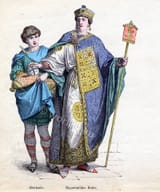Search Results
7/18/2025, 9:20:20 AM
>In the very general outline, we may say, that the orthodox Christian conception of the symphony of the powers (vulgarly called “Caesarean Papistry”) is associated with the comprehension of eschatological significance of not only the Christian Empire. Hence the teleological and soteriologic function of the Emperor, based on the 2-nd message of Saint Apostle Paul to Phessalonicians, in which the question was about the “holding one”, “cathehon”. The “holding one” is identified by the orthodox Christian exegetes with the Orthodox Christian Emperor and the Orthodox Christian Empire.
>The defection of the Western church is based on denial of the symphony of the powers, on the rejection of the social and political, but at the same time eschatological doctrine of the Orthodox Christianity. It is eschatological because the Orthodox Christianity links the presence of the “holding one”, which hinders the :advent of son of perdition” (=antichrist), with the existence of just politically independent orthodox Christian state, in which the temporal power (Basileus) and the spiritual power (patriarch) are in strictly defined correlation, determined by the principle of the Symphony.
>With this arguement Dugin manages to synthesise Christianity with Evola by saying that the Ghibbelineism that Evola was so fond of (Frederick II etc.) represented a western orthodox backlash against the usurpations of the papacy. Dugin also mentions that the system Dante outlined in De Monarchia is the same as the Byzantine symphonia of church and state which the papacy destroyed in the west with their wars against the emperors.
>The defection of the Western church is based on denial of the symphony of the powers, on the rejection of the social and political, but at the same time eschatological doctrine of the Orthodox Christianity. It is eschatological because the Orthodox Christianity links the presence of the “holding one”, which hinders the :advent of son of perdition” (=antichrist), with the existence of just politically independent orthodox Christian state, in which the temporal power (Basileus) and the spiritual power (patriarch) are in strictly defined correlation, determined by the principle of the Symphony.
>With this arguement Dugin manages to synthesise Christianity with Evola by saying that the Ghibbelineism that Evola was so fond of (Frederick II etc.) represented a western orthodox backlash against the usurpations of the papacy. Dugin also mentions that the system Dante outlined in De Monarchia is the same as the Byzantine symphonia of church and state which the papacy destroyed in the west with their wars against the emperors.
7/17/2025, 11:47:39 AM
>>17847051
This same emperor also wanted an alliance with Frederick II who was interestingly enough, was dissatisfied with the Pope considering the byzantines to be schismatics and heretics. The true redpill is not to hate the byzantines for wanting good relations with the muslims but the Papacy and the Guelphs who were power hungry for the temporal realm which naturally belongs to the emperors, if only the alliance between the Ghibellines in the west and the byzantines would have been acomplished, Evropa would have been saved. Also this implies a backing on Papal Supremacy in general so no Reformation either, no Enlightenment, possibly no Renaissance since Papal rise in power coincided with the rise of de Medici and other degenerate bankers, basically no modern world but a strong and united imperial Evropa.
This same emperor also wanted an alliance with Frederick II who was interestingly enough, was dissatisfied with the Pope considering the byzantines to be schismatics and heretics. The true redpill is not to hate the byzantines for wanting good relations with the muslims but the Papacy and the Guelphs who were power hungry for the temporal realm which naturally belongs to the emperors, if only the alliance between the Ghibellines in the west and the byzantines would have been acomplished, Evropa would have been saved. Also this implies a backing on Papal Supremacy in general so no Reformation either, no Enlightenment, possibly no Renaissance since Papal rise in power coincided with the rise of de Medici and other degenerate bankers, basically no modern world but a strong and united imperial Evropa.
Page 1

